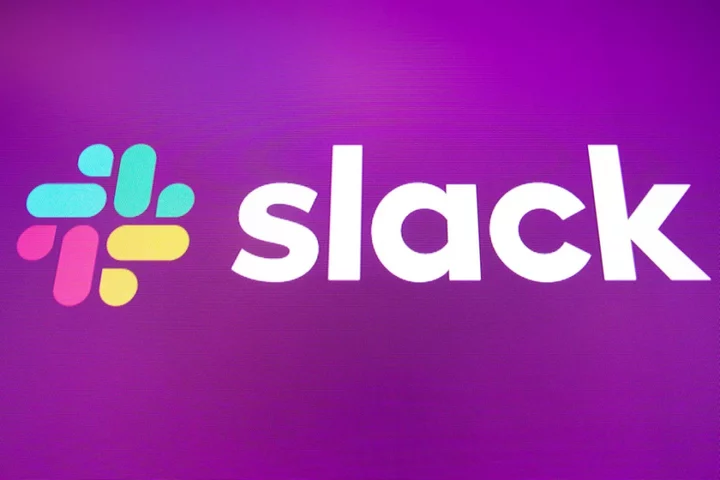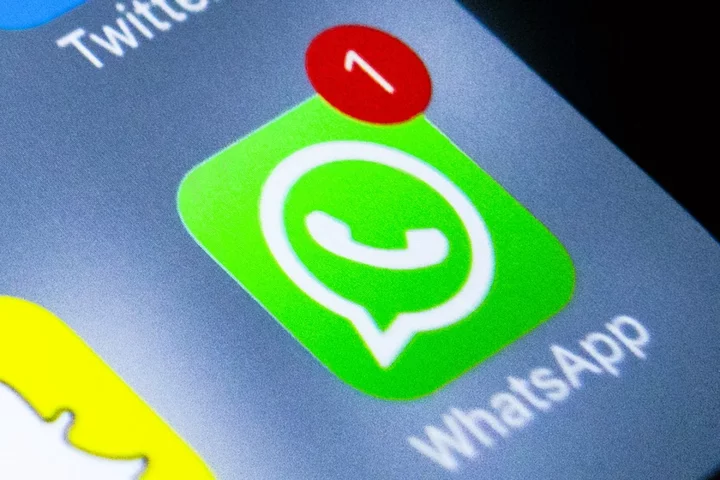
Mark Zuckerberg shows off Meta’s new AI Ray-Bans, using it to braid daughter’s hair
Meta chief Mark Zuckerberg showed off the company’s new artificial intelligence-powered Ray Ban smart glasses in an Instagram post where he uses the technology to braid his daughter’s hair. In the video, the Meta boss asks his Ray-Bans, “Hey Meta, how can I make a braid?” The AI in the smart glass then seemingly guides Mr Zuckerberg through the steps as he braids his daughter’s hair. He then proceeds to take a photo of the braid and captions it “Finally learned to braid. Thanks, Meta AI” to send his wife. “Hey Meta, send a photo to Priscilla on WhatsApp,” Mr Zuckerberg commands the glasses. The smart glasses, made in collaboration with Ray-Ban, were released last month at Meta’s Connect event. The AI glasses feature a camera that can record, and speakers in the glasses’ arms. Meta envisions the glasses to help wearers move between “virtual and real worlds,” to help them experience the “metaverse” around which the company has organised. The latest version of the smart glasses cost £299 or $299 and brings with it improved cameras, a lighter design, and new features like livestreaming. When previous versions of the glasses were released – also with the ability to record video – they were met with privacy concerns as people could record others without their knowledge using the AI Ray Bans. The latest version comes with lights that let others know they’re being recorded. The lights also blink when a photo is taken, and there’s also a solid white light that stays on when a video is being recorded. Along with the AI Ray Bans, Meta also unveiled its Meta Quest 3 virtual reality headset last month. The latest version, the company said, would allow “passthrough” to the real world, enabling virtual objects to be layered on top of it. The Meta Quest 3 costs $500 (£480) compared with $3,500 for Apple’s Vision Pro headset. While Meta Quest 3 has considerably lower specs than its competitor, the company said it stands out from Apple’s competition by offering a more social version of mixed reality. Read More Instagram Threads adds yet more features as it tries to take over from Twitter Scientists receive powerful signal from the depths of the universe Solar energy is set to eclipse fossil fuels as world passes ‘tipping point’ Meta unveils ‘creepy’ AI chatbot that looks exactly like Kendall Jenner Zuckerberg says Metaverse can bring back the dead – virtually Meta unveils new Quest 3 headset and smart glasses that allow for virtual experiences in the real world
2023-10-20 20:27

Slack to retire its status account on Elon Musk’s X
Workplace messaging app Slack is retiring its status update account on X – formerly Twitter – where it previously shared updates about issues such as outages on the platform. “We made the decision to retire the @SlackStatus account,” the company posted on X. “We’ll continue to share other Slack news and provide support through our main account, @SlackHQ,” it said. The X account had been a useful source of information about ongoing issues with the platform and about problems being investigated by the company. Slack said it is consolidating news related to incidents in its status site. “Moving forward, the Slack Status site, https://status.slack.com, will be the source of truth for all incident news,” the company noted, adding that users can also reach out at feedback@slack.com “with any questions or feedback.” “Alerts will also be available through the RSS and Atom feeds linked at the bottom of the Slack Status home page,” Slack noted. Slack has undergone a number of technical issues this year with the app going offline during the workday for many users globally multiple times. The latest move by Slack to stop providing updates via its status account on X comes as the number of daily active users has declined on the social media platform following Tesla chief Elon Musk’s purchase of the company last year. X chief Linda Yaccarino said earlier this year that the company had about 225 million daily active users at the time – marking a decline of over 10 per cent of users from just before Mr Musk acquired the company. Market intelligence firm Similarweb also noted in a report recently that X’s global traffic is down by about 14 per cent year-on-year in September. Similarweb said the drop in user retention is “a bad sign for app user loyalty” for Twitter following the launch of rival app Threads by Instagram. Mr Musk also noted in July that the platform’s ad revenue was down 50 per cent as social media competition mounts. Other companies, including American Express and Air France have also stopped providing customer service over X. American Express had made its @AskAmex account private, while AirFrance said in April that it would stop offering support to customers via direct messages on the social media platform, The Verge reported. Read More Tesla’s profits dip as Musk goes on rant about staff working from home Elon Musk’s X may charge some users $1 a year to post on platform EU to investigate X’s handling of disinformation over Hamas attack on Israel Could X’s creditors push the social media company into bankruptcy? Slack down: Work chat app goes down as the working day begins Why taking a mental health day could be bad… for your mental health
2023-10-20 15:47

AIG’s CEO Sees Pandemic, Wars and Climate Change Among Biggest Risks
American International Group Inc. Chief Executive Officer Peter Zaffino said the biggest challenge to the insurance sector over
2023-10-20 02:58

Solar energy set to eclipse fossil fuels as world passes ‘tipping point’, study reveals
Solar energy has reached an “irreversible tipping point” that will see it become the world’s main source of energy by 2050, according to a new study. Researchers at the University of Exeter and University College London analysed recent technological and economic advances to determine that the transition to clean energy is not just reachable, but inevitable. “The recent progress of renewables means that fossil fuel-dominated projections are no longer realistic,” said Femke Nijsse from the University of Exeter. “Using three models that track positive feedbacks, we project that solar PV will dominate the global energy mix by the middle of this century.” Barriers may still arise to hamper this positive trend, the researchers noted, including political resistance from anti-environmentalists and the lack of financing for solar power in developing countries. “Solar energy is the most widely available energy resource on Earth, and its economic attractiveness is improving fast in a cycle of increasing investments,” the researchers wrote in a study detailing their findings. “We find that, due to technological trajectories set in motion by past policy, a global irreversible solar tipping point may have passed where solar energy gradually comes to dominate global electricity markets, without any further climate policies.” The study, titled ‘The momentum of the solar energy transition’, was published in the journal Nature Communications. The latest research comes less than a month after a Berlin-based research institute calculated that fossil fuel-generated power will no longer be economically viable within the next 30 years due to the plummeting costs of solar, batteries and other renewable technologies. The Mercator Research Institute on Global Commons and Climate Change (MCC) found that the transition to renewable energy was “cheaper than expected” and could make fossil fuels obsolete by 2050. “This is an extremely optimistic scenario – but it illustrates that the future is open,” MCC researcher Felix Creutzig noted. “Climate science, which provides policymakers with guidance in its scenario models, must reflect technical progress as closely as possible.” The UK saw a record-breaking year for renewable energy last year, and is on track to do the same in 2023 following the installation of new solar and wind plants. Wind, solar, biomass and hydro power generated 40 per cent of the country’s electricity in 2022, according to figures compiled by Imperial College London, up 5 per cent from the year before. Read More Fossil fuels ‘becoming obsolete’ as solar panel prices plummet Solar panel breakthrough could supercharge ‘miracle material’ production ‘Game-changing’ facial recognition technology catches prolific shoplifters WhatsApp update will change how you log in forever Amazon trials humanoid robots to see if they can help staff warehouses
2023-10-20 00:49

EU asks Meta for more details on efforts to stop illegal and inaccurate content on Israel-Hamas war
The European Union has told Meta it has a week to explain in greater detail how it is fighting the spread of illegal content and disinformation on its Facebook and Instagram platforms following the attacks across Israel by Hamas.
2023-10-20 00:21

New York AG accuses crypto firms of deceiving investors in $1 billion fraud
On Thursday, New York's attorney general filed a lawsuit against three digital asset firms that were caught up in the collapse of Bankman-Fried's empire last fall — Gemini Trust, Genesis Global Capital and Digital Currency Group, parent company of Genesis.
2023-10-19 23:29

Snapchat isn't just for teens anymore. Now it needs to make some real money
When Snapchat announced last month that it had reached 5 million paying subscribers for its Snapchat+ service, it seemed like a stunning achievement. The milestone marked the halfway point to the 10 million subscriber number that CEO Evan Spiegel had just months earlier identified as a "medium-term" goal.
2023-10-19 21:57

Nintendo Download: Wander Into Whimsy
REDMOND, Wash.--(BUSINESS WIRE)--Oct 19, 2023--
2023-10-19 21:16

Larry Fink Leads CEOs Back to COP Talks They Snubbed Last Year
Wall Street is returning to climate talks that it largely snubbed last year, as the United Arab Emirates
2023-10-19 19:54

Giant heat-emitting mass discovered under the surface of the Moon
A huge mass of heat-emitting rock has been found buried beneath the surface of the Moon. The incredible discovery was made beneath one of the Moon’s craters, where a large mass of granite has slowly been releasing heat for years. Experts know that the Moon used to have eruptions and lava fields flowing from it, but until now, they have never uncovered evidence that is reminiscent of Earth-like volcanoes, underneath which granite forms when magma cools and crystalises deep beneath the surface. Now, that has changed after astronomers looked a bit more deeply at what lies beneath the Compton and Belkovich craters, located on the far side of the Moon. There they came across a large piece of granite rock that is emitting heat. The discovery excited experts as granite is not commonly found outside of Earth. Granite on the Moon was discovered using data from both Chinese and American lunar orbiters, and the information has revealed a whole new volcanic process never before witnessed. In a statement, one of the lead researchers, Dr Matt Siegler, from the Planetary Science Institute, said: “Using an instrument looking at microwave wavelengths – longer than infrared – sent to the Moon on both the Chinese Chang’E 1 and 2 orbiters, we have been able to map temperatures below the surface. “What we found was that one of these suspected volcanoes, known as Compton-Belkovich, was absolutely glowing at microwave wavelengths.” He continued: “What this means is that it is hot, not necessarily at the surface, as you would see in infrared, but under the surface. “The only way to explain this is from extra heat coming from somewhere below the feature within the deeper lunar crust. So Compton-Belkovich, thought to be a volcano, is also hiding a large heat source below it.” Using the data, they believe the 12-mile wide dip makes up the caldera, or depression, of the ancient volcano, where the surface temperature is 10°C higher than the surrounding areas. The volcano is thought to have last erupted 3.5 billion years ago and experts believe the heat that is emitting from the granite below is due to trapped radioactive material in the rock. Sign up to our free Indy100 weekly newsletter Have your say in our news democracy. Click the upvote icon at the top of the page to help raise this article through the indy100 rankings.
2023-10-19 19:54

‘Game-changing’ facial recognition technology catches prolific shoplifters
Britain’s biggest police force is using “game-changing” facial recognition technology to catch prolific shoplifters. The Metropolitan Police asked 12 retailers to provide images of 30 of the worst offenders who steal from their shops in a pilot of the new software. They were compared against the force’s custody shots, and of 302 images submitted, 149 came up as positive matches. Those matches are now being investigated further with a view to building criminal cases. The software uses biometric measures of a person’s face and works even if part of their face is covered. It takes around 60 seconds to find a match. Commissioner Sir Mark Rowley said: “We’re working with shops across the capital to target and track down criminals in a way we never have before. “We’re pushing the boundaries and using innovation and technology to rapidly identify criminals. “The results we’ve seen so far are game-changing. The use of facial recognition in this way could revolutionise how we investigate and solve crime.” He claimed that most of the prolific offenders were involved in other, more serious criminal activity. “What’s most powerful is what we’ve learned about those involved in this offending so far. It’s clear the majority are career criminals involved in serious crime,” Sir Mark said. “This data and information helps us focus our efforts in an even more precise way than we originally anticipated. “Through this tactic we’re not only improving how we protect shops and support the business community, we’re stepping further forward in identifying and tracking down serious criminals and protecting all of London’s communities. “The scale of business crime in London is huge. To be successful we have to be precise in our approach and this is a really promising step forward.” Met police last year." data-source=""> Chief executive of the Association of Convenience stores James Lowman said while the technology could save police time, there is still a challenge in getting offenders off the street. He said: “Using artificial intelligence to identify prolific offenders can be an effective way of drastically reducing the amount of police time it takes to make links between crimes committed against different businesses locally. “Whether its artificial intelligence or local intelligence that leads to criminals being identified, the real challenge remains apprehending these offenders and getting them off the streets.” The Met started using the software in August and began the retail pilot in late September. The new system can use images from CCTV, dashcams, doorbell cameras or phones. It uses the same algorithm as the Met’s live facial recognition technology, about which there have been well-publicised concerns over potential bias. Lindsey Chiswick, director of intelligence for the Met and national policing lead on facial recognition, said the algorithm has been independently tested by the National Physical Laboratory. She said: “Facial recognition technology, which is able to match faces after the event, has actually been around for quite a few years. “What’s changed and what is improving all the time, and in the last few years with real speed, is the accuracy of the algorithm. And that’s the real game changer here. “With this technology, it’s an algorithm that we’ve independently tested through the National Physical Laboratory so we have assurance it’s 100% accurate when it comes to retrospective usage, and we understand how it works.” Around 50,000 shoplifting incidents were reported to the Met last year, estimated to be between 5% and 10% of the offences that are actually committed. Emmanuelle Andrews, from human rights charity Liberty that has campaigned against the use of facial recognition, said: “Facial recognition has no place on our streets, in our shops – or in any other areas of our lives. “This technology threatens our privacy and stifles free speech – and we should all be worried about moves to expand its reach. “We’re also concerned about the creep of facial recognition technology into other areas of policing. “Let’s be clear: we cannot rely on tech to solve deep societal problems, this is an unjustified expansion of state surveillance and there are numerous alternatives.” Read More Facial recognition firm Clearview AI overturns UK data privacy fine Sadiq Khan, Met Commissioner to ask phone companies to ‘design out’ theft Microsoft gets go-ahead to buy Call of Duty maker Activision Incels using TikTok to spread ‘hateful beliefs’, research suggests Duke and Duchess of Sussex call for overhaul of social media Google to trial AI in UK traffic light systems to reduce stop-and-go emissions
2023-10-19 17:50

WhatsApp update changes how billions log in to messaging app
WhatsApp is changing the way billions of users log into the messaging app, ditching passwords and two-factor authentication in favour of quicker and more secure passkeys. The move is part of a major shift within the tech industry to move away from decades-old password technology and replace it with the more modern passkey format, which combines biometric information like fingerprints with a simple numeric code in order to identify people. A similar switch was recently announced by Google, which will introduce passkeys to its apps like Maps, Search and YouTube. WhatsApp’s update will only impact Android users to begin with. “Passkeys are a new way to log back into your account,” said Will Cathcart, who heads WhatsApp. “This is a more secure way of confirming it’s really you – and gives you an added layer of security.” WhatsApp is also rolling out self-destructing voice notes to users as part of new measures to improve privacy on the world’s most popular messaging app. The update is currently only available for beta tester users who have the latest version of WhatsApp installed on their phone or computer, though it is expected to eventually be introduced for all users. With more than 2.7 billion users worldwide – the majority of which on Android devices – WhatsApp updates typically need to be introduced gradually in order to make sure any potential security bugs do not have a critical impact. The self-destructing audio messages, first spotted by WhatsApp feature tracker Wabetainfo, is compatible with both Android and iOS users, though no date has been given for when a wider roller out might be expected. WhatsApp does not comment on release schedules for feature updates unless they relate to security. “After sending the voice note with view once mode enabled, you won’t be able to listen to it and the recipient can no longer listen to the voice note after dismissing it,” Wabetainfo noted. “This mode effectively minimises the chances of unauthorised access or later listening, providing a new layer of privacy for sensitive and confidential information.” The latest update follows recently added features like ‘Channels’, which allow people to follow celebrities and companies within the app, and a ‘Create’ button that gives users the ability to make custom art on the platform. The Create feature brings generative artificial intelligence to WhatsApp for the first time, and means users do not require external tools or specific design skills to create the stickers. Instead, the custom stickers can be produced using simple text-based prompts, similar to other AI image generators like Midjourney and OpenAI’s Dall-E. Read More Facebook and Instagram users face monthly fee for ad-free version Meta launches AI chatbots with ‘personalities’ to take on ChatGPT Viral WhatsApp warning of cyberattack targeting Jewish people is fake Amazon trials humanoid robots to see if they can help staff warehouses Tesla’s profits dip as Musk goes on rant about staff working from home
2023-10-19 17:25
You Might Like...

Betterworks Named “Best Comprehensive Solution” for Talent Management by Lighthouse Research & Advisory

Gravity Officially Launches Mobile Idle Relaxing Game ‘WITH: Whale In The High’ for the Global Region!

Twitter Says Ads Mostly Unaffected by Limits That Target Bots

Westlands Advisory’s ‘Industrial Cybersecurity Outlook 2023-2030’ Hails TXOne Networks’ Solution for IT/OT Network Protection

Once Silicon Valley’s Star, Cisco Looks to Splunk for Fresh Mojo

Elon Musk's social media site X sues California over content moderation law

The Real Brokerage Elevates Jenna Rozenblat to Chief Operating Officer

IPG Mediabrands Launches Industry’s Most Powerful Delivery Engine Under KINESSO Banner
